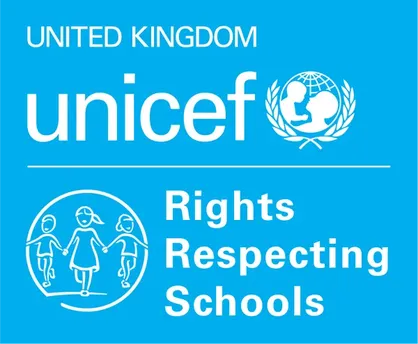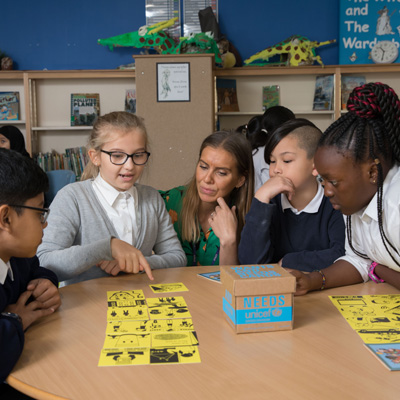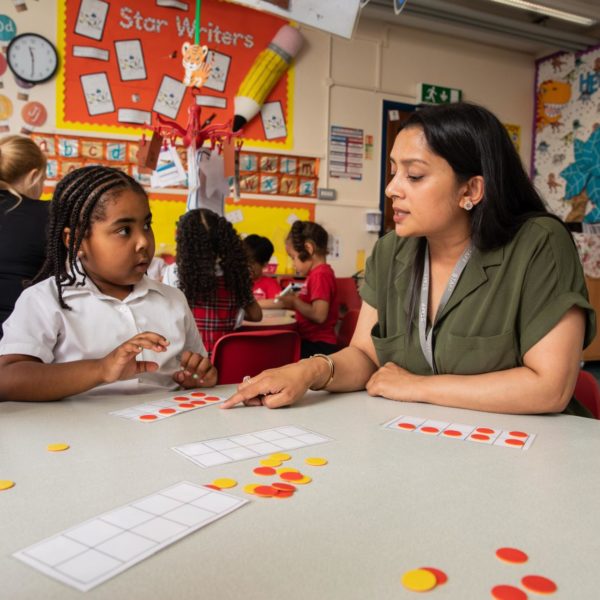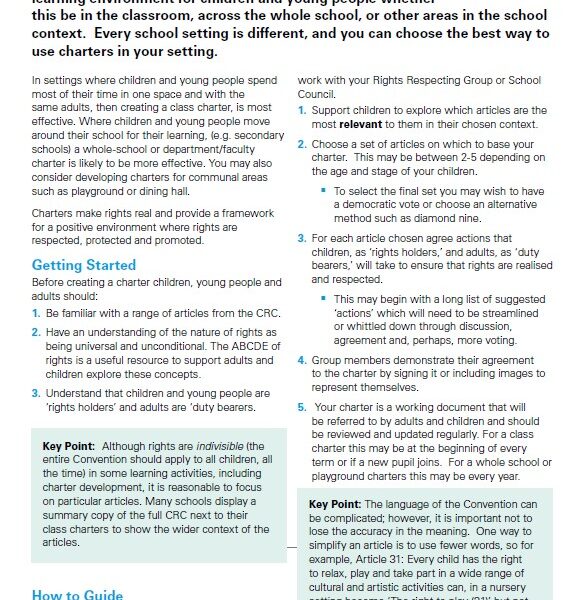Framing teaching around children’s rights can have step-change effect on secondary education. The Howard School, a non-selective boys’ school in Medway, Kent, has a mission to challenge young men to achieve and placing children’s rights centrally in their practice has played a key role in accomplishing this.
“It was a wet Thursday afternoon, I’m coming to see an all-boys non-selective school as a prospective head, I thought ‘bet this is going to be tough,’” says headteacher Terry Millar, “And I was shown around by one of the assistant heads. I figured he would cherry pick a good Year Seven class to show me.
“No, no. Year Ten maths last thing on a wet Thursday. And the students were immaculate, absolutely immaculate. So I think even before I knew anything about the Rights Respecting Schools Award it was evident that something was going on here.”
Terry joined The Howard School in 2016 but the school has been involved with the Award since 2012 and have recently achieved Gold, the highest level of the Award, for the second time.
UNICEF UK’s Rights Respecting Schools Award recognises a schools achievement in putting the UN Convention on the Rights of the Child at the heart of a schools practice. In the UK over 4500 schools are working towards the Award. The Howard School is one of only 22 schools in England who have been accredited Gold twice, and of this number only two are secondary
We take boys, some of whom might not have had the best time in primary school, and we work hard with them to get them the grades they need to open doors,” says Terry. “We equip boys with the skills they need to excel in the world and take their place in the community. That is where the Rights Respecting framework comes in.
“We take boys, some of whom might not have had the best time in primary school, and we work hard with them to get them the grades they need to open doors,” says Terry. “We equip boys with the skills they need to excel in the world and take their place in the community. That is where the Rights Respecting framework comes in.”
Chris Grabski, who has led the Rights Respecting work at The Howard from the start, was looking for a way to raise student voice when he came across the Award.
“I caught the tail end of the old Howard where behaviour was poor and the results were not great. I wanted this school to be a school where children can say ‘this is my school and I am proud of it.’”
Rather than a focus on attainment, which at the time was gradually improving, it was a desire to focus on student voice and the quality of relationships that prompted Chris to bring children’s rights into the classroom.
Rights-based change across the school
As a secular school there was also a need for a system of values that both teachers and students could work to. A school charter was developed by the boys themselves. It links articles of the UN Convention through to values and an agreed set of standards. The document forms the basis of the values the school operates by.
“If you don’t have anything you have to create something, much better we create it around a set of values that are enshrined within the UN Convention,” said Terry. “Now we have taken them and adapted them for our own use and put them into the student charter. In terms of a set of values and beliefs to build the school around it makes absolute sense.”
Children’s rights are taught, lived and understood at The Howard School, which means the boys get a real say in the way the school is run.
“One of the major things we’ve changed this year is staff development time,” explains Terry. “Giving staff bespoke training depending on where they are in their career stage so we can improve the quality of teaching and learning.
“To do that I wanted to rejig the whole timetable so we had a longer day on Monday and a shorter teaching day on Friday to give staff weekly development time. Obviously this was a major change for all stakeholders, so this time last year we undertook a consultation with children, parents, carers and staff.”
“I presented the changes in assemblies, why we were making them, and what the advantages and downsides could be. Then I invited students to take part in a consultation to give their opinions and raise any issues.
“Younger students wanted to know what facilities would be available on Fridays and the older ones wanted to know if teachers would still be available close to exams to work with them. So we looked at that and built time in to the development programme.
“And what I thought would happen is that lots of students would want to stay after school and then it would tail off but in fact it has increased because they actually want to be here! The boys had a direct say on a major shift in the school and in terms of them having a voice in the way the school is run, they absolutely have that.”
Behaviour and relationships between staff and students are based on respect. Around the school the atmosphere is calm and friendly. Conversations between teachers and students are a calm back and forth, classes are controlled without constriction. The number of after-school activities on offer speak to the community spirit at The Howard and backs up Terry’s claim that the boys like spending time there.
Howard boys are friendly, pleasant, respectful young men but as Chris says, “we are not going to turn them into angels just yet!”
The Howard’s approach to discipline is more about rebuilding relationships than it is about punishment. Tense situations are diffused with humour and when things go awry the way a relationship is mended is a big focus.
The right to be heard, front and centre
“We all have days where we can lose our rag but what happens next matters, and that is another change from before we began the Award.
“Our same day detention system is not just about punishment, it’s about making up. Before detention was a punishment and there were more and more detentions and punishments because we felt that was the only way we could keep control sometimes,” explains Chris. “This is a shift away from that control mentality and the boys quite appreciate the fact that if they do something it is dealt with that day.”
“We collect them from the lesson, take them to the hall, the teacher will come down and they have a conversation. The boy has the opportunity to say his piece and there is a senior member of staff there to help with the restoration process.
“It places the students’ right to be heard front and centre. The teacher leaves happy the student leaves happy and it resolves the ongoing conflict you might otherwise have of the student not turning up for the lesson or things being tense. Overall it has been really powerful for us.”
When you give young people responsibility for their learning they become a lot more active in lessons.
In lessons, links to rights are made in all aspects of the curriculum, providing a new way to teach some subjects and providing an easier ‘in’ for harder sell topics. While attainment was not the key driver for the school’s involvement in the Award, this shift in student voice and relationships has had an impact on results too.
Chris says, “When you give young people responsibility for their learning they become a lot more active in lessons. In my classroom I used to have the desks laid out in rows because it gave me more power and ‘control’ with my group. But I decided to move them in to groups of tables and this gives the boys more freedom and independence.
“They are facilitated in their lessons rather than taught in the traditional way. This is their school and our boys want to do well. There are a number of good schools in our area, including grammar schools, so there is pressure on us. And at the same time we are an oversubscribed school and that says something.”
For The Howard School the future lies in equipping their young men to achieve in their lives, as active citizens in their community with a sense of global justice.
“The role of men is being questioned right now,” says Terry. “So what can we do with the nearly one and a half thousand boys we’ve got here? A lot of them will become dads, form relationships with other people, and what we can do here is help them take their place and give them an idea of how to be a man, what that could look like. And equally for students who don’t identify as male, how do we support them too?
“Yes, our fundamental priority will always be the academic side of things and the work we are doing to improve the quality of teaching in the classroom will go a long way to improving the academic outcomes. But more than that a school is not just about the academic outcomes it is about the parts that can’t be measured.”






